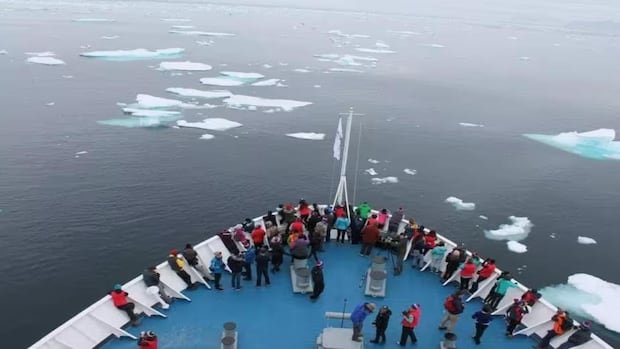Riley Adams-Lachance was filled with anticipation as she prepared to embark on her inaugural journey from Nunavut to Kalaallit Nunaat (Greenland) with the Students on Ice Foundation. “I am eager to witness the diverse wildlife, ice formations, and landscape of the region,” expressed the resident of Rankin Inlet, Nunavut, while awaiting boarding on Wednesday.
For a quarter-century, this non-profit organization has been organizing educational expeditions for young individuals from 53 nations to the Arctic and Antarctic. These trips unite students, educators, scientists, and elders to provide insights into culture and environmental awareness.
Adams-Lachance, driven by her interest in climate change and youth empowerment, views the Students on Ice expedition as an opportunity to further these passions. Recollecting her hunting experiences with family members, she aspires for future generations, particularly Inuit, to engage with their heritage and the environment.
Mataya Gillis, a young woman from Inuvik, N.W.T., fondly reminisces about the picnic she enjoyed during her 2018 expedition in the Kangiqtualuk Uqquqti region of Baffin Island. Sitting amidst the breathtaking landscape, she marveled at the privilege of experiencing a location that people pay hefty sums to visit.
Witnessing Inuit individuals from different regions conversing in their native languages was a poignant moment for Gillis, prompting reflections on preserving her own language, Inuvialuktun, which is facing extinction. She aspires to learn from her grandmother, hoping to revitalize their linguistic heritage.
Geoff Green, the visionary behind Students on Ice, envisioned offering transformative experiences traditionally reserved for scientists and tourists to young minds. Collaborating with influential figures like Gov.-Gen. Mary Simon and the late Dr. Fred Roots, Green initiated the program in 2000, leading the first cohort to Antarctica.
Participants like Kata Kuhnert, now a climate researcher, cherish the life-changing experiences of witnessing the Greenland ice sheet, juxtaposing the planet’s beauty with the stark realities of climate change. These expeditions blend western scientific knowledge with Inuit governance, fostering a unique learning environment.
The enduring impact of these expeditions lies in the connections forged among participants. Gillis highlights the network expansion and newfound opportunities, including contributing to research publications at a young age, alongside the cherished friendships made during the expeditions.
Kuhnert emphasizes the importance of uniting people across the circumpolar world, fostering connections that transcend geopolitical boundaries. Celebrating the cultural strength of Inuit communities, she underscores the significance of interpersonal experiences in promoting unity and understanding.
Green advocates for integrating experiential learning into educational systems, emphasizing the transformative power of immersive education. By offering scholarships and advocating for increased accessibility to such programs, he envisions a future where experiential learning is a cornerstone of education.
Adams-Lachance envisions a role for program alumni in raising awareness and inspiring other youth, especially those from indigenous communities, to participate in experiential education opportunities. Sharing personal experiences and passion can encourage shy individuals to explore and embrace new educational pathways.

